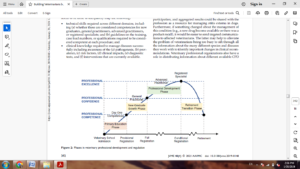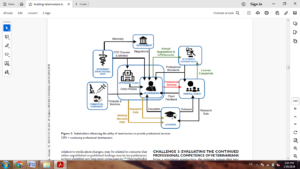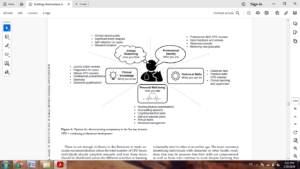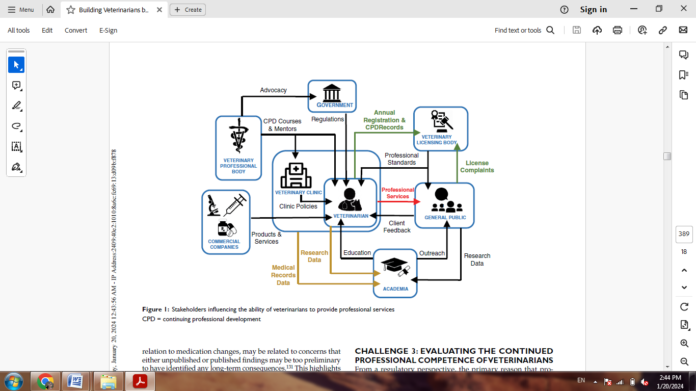Unique and Challenging Veterinary Professional Journey
Asinapuram Sindhura1*Anisetty Shilpa Sree2 Balivada Deepika3
1Assistant Professor, Department of Livestock Products Technology
2Assistant Professor, Department of Livestock Products Technology
3Assistant Professor, Department of Veterinary Parasitology
Institute of veterinary Sciences and Animal Husbandry, SOA DU, Bhubaneswar, Odisha-751003
ABSTRACT
A veterinarian needs to acquire, maintain and enhance their capability to perform competently in their chosen practice area. Traditionally, veterinary curricula focus solely on teaching content knowledge and clinical skills; however, veterinary education curricula must also include dedicated instructions in veterinary professionalism. These must include instruction in communication skills, emotional intelligence, cultural awareness, teamwork abilities, dispute resolution strategies, multiple approaches required to resolve challenges.
This popular article focuses on the fact that new graduates often lack the professional skills and attitudes needed for success in clinical veterinary practice. Hence required skills and needs to be developed through regular training and capacity building programs. In this, we summarize the literature across different health care professions to highlight three key challenges for veterinary CPD programs.
Key Words: Clinical practice, continue professional development and Veterinary graduates,
Introduction:
Veterinarians play a pivitol role in preserving and developing animal resources dwindling poverty hunger globally by fostering rural livelihood. The provision of veterinary clinical services is known to elicit a range of challenges which require an ethical appraisal. These are defining what it means to be professionally competent across different career stages from graduation to retirement. Reflection is a key professional skill that enables veterinary professionals to learn from their experiences in the workplace. Students and new graduates need support to develop their reflective skills to ensure reflection is a positive process with helpful outcomes and formal structured learning opportunities such as conferences, workshops, seminars, online learning modules, and studying for advanced qualifications, as well as more informal learning opportunities such as participating in research studies, having case discussions with colleagues, training junior colleagues or students, reading journal articles, and keeping reflective learning diaries. Given the significant diversity of species, clinical knowledge, technical skills, and work environments that veterinary practice may encompass, there are usually no set topics that must be covered through CPD activities, and the decisions around content are left to the discretion of individual veterinarians.
1) Early Carrier Veterinarian
Individuals who complete a recognized veterinary degree program in reputed veterinary university are often automatically assumed to have Day One Competences at graduation, meaning that they are considered safe to practice, but they most likely require good knowledge, skill, communication, several additional years of experience and supervision in clinical practice to achieve full professional competency.
Recent years have seen a significant change in the teaching of professionalism in primary veterinary qualifications. Formerly, senior students were only exposed to veterinary professionalism through role modeling by clinical teaching staff during clinical rotations and during external placements with private practitioners. Now, it is clear that the attributes and attitudes of professionalism are essential and need to be taught with the same rigor as other medical and surgical skills within the core veterinary curriculum. The former informal socialization processes have become inadequate, and it is evident that veterinary schools are now assuming a greater level of responsibility for providing a program to develop the attributes of veterinary professionalism associated with veterinary career success
The Madras Veterinary College of Veterinary Surgeons (MVC) in Chennai, Tamil Nadu, India, for example, maintains a Day One Skills guide that was developed through a consultative process with general practitioners, specialists, and academics to identify the core skills that are routinely used in practice. When veterinary students were surveyed about their opinions about the guide, most indicated that they appreciated having a framework for knowing what skills they needed to master by graduation but cited the lack of opportunities to practice these skills due to variable case loads, lack of clarity around knowing when they had mastered the skills, and issues with clinical supervisors not allowing students to perform procedures as significant limitations to using the guide to assess their fitness to practice. Unsurprisingly, students were significantly more likely to report confidence in their ability to perform clearly defined technical tasks. This highlights the strong need for better approaches to defining and measuring core clinical competencies.

Fig: Phases in Veterinary Profession Development
2) Mid-Career Veterinarians:
Once an individual has reached basic clinical competence, the main issues affecting continued clinical competency are
(a) Burn out associated with factors such as moral/ethical stress, compassion fatigue,
too much workload, and boredom
(b) Maintaining fitness to practice during career breaks for parental leave, family care
obligations, physical health issues, and mental health issues or when transitioning to a
different area of clinical practice.
(c) The issue of parental leave in particular is becoming a more significant issue in the veterinary profession as the gender balance continues to shift toward more female graduates .Numerous studies have shown that burnout in veterinary professionals is a common problem that can lead to negative outcomes such as
- clinical errors
- alcohol or drug abuse
- poor mental health, which may lead to suicide
- personal conflict within and outside the workplace.
Remedies to Overcome the above challenges:
- This issue is compounded by a perfectionist personality type as well as a reluctance to seek mental health support, which suggests a need to incorporate personal well-being assessments and training into regulated continue professional development.
- Providing veterinarians with skills to tackle the problems that give rise to stress and to normalize the feelings that arise from stress are effective in improving mental health outcomes and incorporating soft-skills training into CPD programs has been shown to have positive benefits on reducing stress.
- It is also important to recognize the positive aspects of working as a veterinarian that many interactions improve the health and welfare of patients and the emotional or financial well-being of clients when animal productivity is improved.
4.There may also be scope for incorporating routine engagement with licensed therapists as part of CPD activities for veterinarians to learn strategies for better supporting themselves, their staff, and their clients through difficult personal and professional situations.

Fig: Continue Professional Development
Both new graduates and veterinarians with established careers have ranked personal and interpersonal skills as more important for career success than a sound knowledge of veterinary
Sciences or even accurate diagnostic skills.
Attributes such as emotional intelligence, self-awareness and self-confidence were more sparsely represented and traits such as cultural competency, information technology, health, welfare advocacy and leadership were perceived to hold little importance for veterinary graduates. interestingly, communication skills were perceived to be important by veterinarians and employers but less so by clients.
3) Retired Carrier Veterinarian:
While there is no question that veterinarians will eventually lose the mental and physical capacity to be competent clinical practitioners as they age, there is still debate over the role of veterinary licensing bodies in regulating the population of older veterinarians. It is certainly possible to provide veterinarians with CPD activities geared toward helping individuals plan for retirement and practice succession, and many individuals will voluntarily elect to retire at an earlier age.
The main concern is identifying individuals with dementia or other health conditions who may be unaware that their skills are compromised, as well as those who continue to work despite knowing that their professional skills are compromised. It would likely be beneficial to introduce similar restrictions as those that have been developed for driving licenses, where individuals over the age of 75 are required to provide medical certificates from their general practitioner / mental health practitioner verifying that they are fit to practice. For individuals practicing because they still want to make valuable contributions to the profession and society, opportunities may exist to leverage their experience in providing mentorship to younger veterinarians, participating in peer review, or leading peer discussion activities.

Fig:2. Five key Domines for continue veterinary profession growth
Veterinary education programs must consider the effects of the hidden curriculum on Professionalism development. The exposure of veterinary students to workplace learning and clinical role models has made them vulnerable to the negative effects of the hidden curriculum; therefore, it is essential that veterinary schools create a culture of positive client–Veterinarian relationships and care in teaching hospitals and external practices. It is vital that the institutional environment supports the teaching of professionalism, as otherwise the negative aspects of the hidden curriculum can compromise the professionalism
Conclusion:
Generally veterinary profession is a challenging role for a young age veterinarian compare to experts in this field. There is still a strong need to understand how the common barriers to behavioral change including busyness, unfavorable practice cultures and resistance to adopting new ideas can be overcome in this practice. Expectations that students effectively develop communication skills, trustworthiness, compassion and social responsibility may, however, be unfair, given the current evaluative criteria of competency and success in contemporary medical and veterinary education. Currently regarded as important attributes in veterinary medicine, and a strong adherence to scientific knowledge and empirical methods permeates the areas of medical and veterinary medicine. Medical and veterinary practice may, however, also benefit from alternative domains of knowledge and modes of enquiry.
Reference:
- Building Veterinarians beyond Veterinary School: Challenges and Opportunities for Continuing Professional Development in Veterinary Medicine, M. Carolyn Gates,Iain McLachlan,Seton Butler and Jenny F. Weston, JVME 48(4) © 2021 AAVMC doi: 10.3138/jvme.2019-0148


